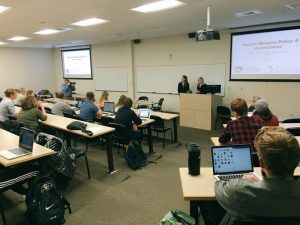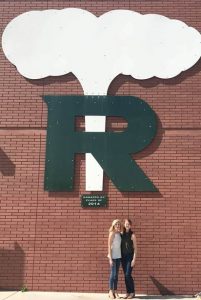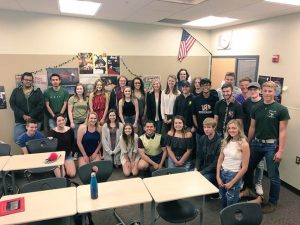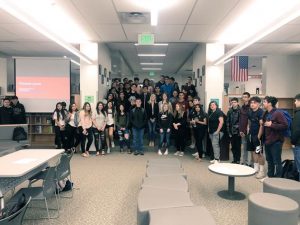Filling the Gaps with a New Kind of “Manhattan Project”
I was sitting in the conference room for my fellowship interview surrounded by 25 or so Herbert Scoville Jr. Peace Fellowship board members when one of them asked the following question: “Have you considered going home to Richland, WA [home of the Manhattan Project’s Hanford Site] to speak with your community about nuclear issues?” I hadn’t considered it, but the seed for our project started in that very moment before I had even been selected as a Scoville Fellow.
Eight months into my fellowship, my colleague Erin Connolly and I were in Washington State, holding binders full of nuclear notes. In a matter of four days, we had given 20 presentations to over 1,100 students from four high schools and one university. The topic: nuclear weapons 101.
While the question from my interview planted the project seed, it was conversations with Erin and our #nextgennukeposse (Namratha Somayajula, Bernadette Stadler and Abigail Stowe-Thurston) that brought the concept to fruition. Our conversations recognized gaps – gaps in nuclear policy and gender; gaps in nuclear policy and generation; and gaps between nuclear policy and public education on these issues. So, Erin and I decided to start filling those gaps ourselves.
And “The Manhattan Project: Engaging the Next Generation on Nuclear” issues was born.
The project goal was two-fold: engage with students from the next generation on nuclear issues and research the baseline understanding of that generation on the topic. To the first goal, we gave a 25 min presentation to classes that covered a variety of topics, including: what is a nuclear weapon, history of the bomb, global nuclear stockpiles, policy debates, North Korea, the Iran deal and nuclear weapons policy careers. After the presentation, we engaged in 15 minutes of dialogue in Q&A. We wanted to lay the foundation for students to not just understand nuclear weapons basics but begin participating in complex nuclear policy issues that will likely impact them for the rest of their lives.
To the second goal, and to better tailor our first goal for the future, we needed to gauge the baseline knowledge of high school students on nuclear issues. To do this, we administered an anonymous, 10 question survey before we began our presentation. Some of these questions included: how many nuclear weapons exist today; which countries have nuclear weapons; and who has suffered a nuclear attack. We were not anticipating the knowledge level to be exceptionally high but what we found, even without in depth data analytics, was the knowledge level to be almost nothing.
Our take away from the Hanford Site presentations was blunt and frustrating. As a country, we are not adequately educating our youth on current global issues, like nuclear weapons policy. We are failing to have tough conversations about issues that have huge implications both domestically and internationally. Nuclear weapons do not discriminate based on knowledge – their destructive potential is the same either way.

Kate and Erin engaged in conversation on nuclear weapons policy with students from Gonzaga University.
Nuclear weapons are abstract for many in my generation and for those that have come after me – but that is no excuse for not participating in the nuclear weapons conversation. The problem is that as a public, we often don’t know where to begin. What are the fundamentals of nuclear policy that the public needs to know? Nuclear weapons policy should not be decided in closed-door meetings without public knowledge or dialogue, but there must be baseline understanding for adequate civic participation. This is why The Manhattan Project matters. We are two young, females – emerging experts in the field – and we are on a mission to fill the gender, generational and public engagement gap in nuclear weapons policy.
Kate Hewitt was a Fall 2017 Scoville Fellow at the Brookings Institution where she currently works as a Research Assistant.



